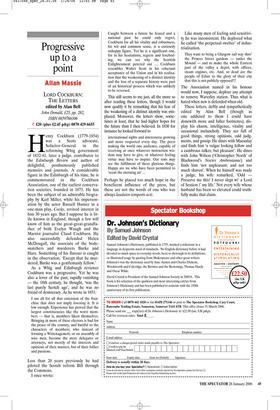Progressive up to a point
Allan Massie
LORD COCKBURN: THE LETTERS edited by Alan Bell John Donald, £25, pp. 282, ISBN 0859766306 ✆ £20 (plus £2.45 p&p) 0870 429 6655 Henry Cockburn (1779-1854) was a Scots advocate, Solicitor-General in the reforming Whig government of 1832-41, later a judge, contributor to the Edinburgh Review and author of delightful, posthumously published memoirs and journals. A considerable figure in the Edinburgh of his time, he is commemorated in the Cockburn Association, one of the earliest conservation societies, founded in 1875. He has been the subject of an admirable biography by Karl Miller, while his impersonation by the actor Russell Hunter in a one-man play, Cocky, revived interest in him 30 years ago. But I suppose he is little known in England, though a few will know of him as the great-great-grandfather of both Evelyn Waugh and the Marxist journalist Claud Cockburn. He also successfully defended Helen McDougall, the associate of the bodysnatchers and murderers Burke and Hare. Something of his flavour is caught in the observation, ‘Except that he murdered, Burke was a gentlemanly fellow.’ As a Whig and Edinburgh reviewer Cockburn was a progressive. Yet he was also a lover of the past, rapidly vanishing — the 18th century, he thought, ‘was the last purely Scotch age’, and he was no friend of democracy. As he wrote in 1851: I am all for all that extension of the franchise that does not imply lowering it. It is low enough. Experience has proved that the largest constituencies like the worst members — that is, members likest themselves. Bringing in more of these electors is bad for the peace of the country, and hurtful to the characters of members; who instead of forming a Wittenagemott, or an assembly of wise men, become the mere delegates or attorneys, not merely of the interests and opinions of their masters, but of their follies and passions.
Less than 20 years previously he had piloted the Scotch reform Bill through the Commons.
I once wrote:
Caught between a future he feared and a national past he could only regret, Cockburn for all his vitality and robustness, his wit and common sense, is a curiously unhappy figure. Yet he is a significant one, for in his hesitations, regrets and foreboding, we can see why the Scottish Enlightenment petered out ... Cockburn resembles Walter Scott in his reluctant acceptance of the Union and in his realisation that the weakening of a distinct identity and the loss of a separate history were part of an historical process which was unlikely to be reversed.
This still seems to me just, all the more so after reading these letters, though I would now qualify it by remarking that his fear of the weakening of a distinct identity was misplaced. Moreover, the letters show, sometimes at least, that he had higher hopes for the future than I then believed. In 1830 for instance he looked forward to
international rights and intercourse growing and more respected every day. The press making the world one audience, capable of receiving at once whatever instruction wisdom may have to give, or whatever feeling virtue may have to inspire. Our sons may see the fulfilment of these glorious things. Happy are we who have been permitted to ‘scent the morning air’...
Perhaps he placed too much hope in the beneficent influence of the press, but these are not the words of one who was always laudator temporis acti. Like many men of feeling and sensitivity he was inconsistent. He deplored what he called ‘the perpetual swelter’ of industrialisation.
They want to bring a Glasgow rail way thro’ the Princes Street gardens — under the Mound — and to make the whole Eastern part of the valley a depot, with offices, steam engines, etc. And, so dead are the people of Edinr to the glory of their city that this is not publicly opposed!!!
The Association named in his honour would now, I suppose, deplore any attempt to remove Waverley station. Thus what is hated when new is defended when old.
These letters, deftly and sympathetically edited by Alan Bell (though as one addicted to them I could have donewith more and fuller footnotes), display his charm, intelligence, vitality and occasional melancholy. They are full of good things, strong opinions, odd judgments, and gossip. He dines with Macaulay and finds him ‘a vulgar looking fellow and a cumbrous talker, but pleasant’. He dines with John Wilson (‘Christopher North’ of Blackwood’s Noctes Ambrosianae) and finds him ‘not unpleasant; and not too much shaven’. When he himself was made a judge, his wife remarked, ‘Odd Preserve me this! I never slept wi’ a Lord of Session i’ my life.’ Not every wife whose husband has been so elevated could truthfully make that claim.






















































 Previous page
Previous page